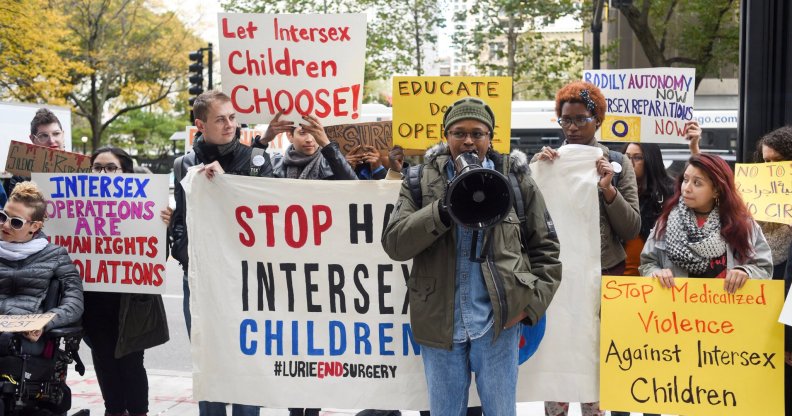Top paediatric hospital agrees to end unnecessary genital surgeries on intersex babies – but there’s still much more to be done

Protestors in 2017 demanding Lurie Children’s Hospital stop performing medically unnecessary surgeries on intersex babies. (Twitter/Love+Struggle Photos)
Boston Children’s Hospital is the second major US hospital to vow to stop performing unnecessary genital surgeries on intersex babies — marking what could be a watershed moment for intersex rights.
The top paediatric hospital has agreed to stop performing two types of genital surgery, clitoroplasty and vaginoplasty, on children who are too young to meaningfully consent.
The intersex community has long called for an end to such surgeries, pointing out that the high-risk and non-consensual surgeries can lead to painful physical and psychological problems.
Boston Children’s Hospital’s decision follows that of the Ann & Robert H Lurie Children’s Hospital of Chicago, which in July became the first US hospital to suspend genital surgeries on intersex children and acknowledge that its policy of operating on intersex babies was “harmful and wrong“.
“One hospital was cool, but people might be like, ‘Oh, that’s an anomaly’,” Pidgeon Pagonis, co-founder of the Intersex Justice Project, told The 19th.
“Now that there are two hospitals, people in the community are going to feel more ability to pressure their hospitals to do the same.”
However, Boston Children’s Hospital has not said it will stop performing other intersex surgeries, including gonadectomies, which constitute the removal of certain reproductive glands, or phalloplasties, which enlarge penises.
“Vaginoplasties and cliteroctomies are very destructive, and it’s very welcome news,” Pagonis added. “But it means there’s still more work to do.”
Pagonis called for the hospital to commit to ending all unnecessary intersex surgeries, apologise and create a “reparation fund for past survivors of their brutal care”.
Full statement to me: pic.twitter.com/tn5WI0BbAm
— Nora Neus (@noraneus) October 21, 2020
Roughly 1.7 per cent of people are born intersex, which means they have sexual or reproductive anatomy that doesn’t neatly match the binary of male or female. Historically, medical professionals have used surgery and hormone treatment to force intersex children’s physical appearance to fit the gender binary.
This practice is legal worldwide, but has been condemned by human rights organisations including the United Nations, Amnesty International and Human Rights Watch. Activists have spent decades protesting the treatment of intersex children.
Kimberly Zieselman, the executive director of interACT: Advocates for Intersex Youth, said of Boston Children’s Hospital’s decision: “As an intersex woman who was raised in Massachusetts, I am proud that BCH finally recognised the dignity of intersex people.
“We must be able to live free from the threat of non-consensual medical interventions based on discrimination and fear of differences in sex anatomy.”
Boston Children's is the second U.S. hospital to shut down some types of infant genital surgeries.
"Now that there are two hospitals, people in the community are going to feel more ability to pressure their hospitals to do the same,” said @Pidgejen. ?https://t.co/N2xjzeQp8Y— interACT (@interACT_adv) October 21, 2020

